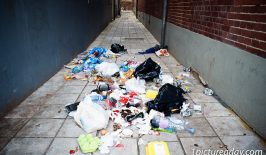The Egyptian capital of Cairo has long struggled with issues of fly-tipping and street dumping. Plastic waste has long been a ubiquitous presence lining the streets of Cairo, with Egypt producing 5.4 million tonnes of plastic waste a year. However, as Egyptians become more affluent and technology more affordable, it is now not unusual to see electronics, such as old televisions, speaker systems and microwaves, also dumped on the side of the road.
Now, a new app based in Cairo is looking to improve on this situation. E-Tadweer is a mobile application which provides users with quick and easy access to electronics recycling services. The app, launched in collaboration with the Egyptian Ministry of Communications and Information Technology and with assistance from the Swiss Embassy, is connected to seven different recycling factories with the necessary equipment to safely recycle electronic goods.
To encourage members of the public to take up the new application, users receive awards and discounts from participating stores, including those which sell electronic goods. It is hoped these incentives, including guaranteeing a reduction in the price of their next electronic purchase, will drive participation and go some way to decreasing the 88,000 tonnes of e-waste produced in Egypt annually. Although of course, incentivising the purchase of new electronics could be seen as adding to the problem, of course…
In recent years, the Egyptian government has increased its efforts to tackle its burgeoning pollution and waste problems. According to Eco Experts, Cairo – which is home to 19.5 million inhabitants – is the most polluted city in the world, with air, noise and street pollution leading to growing health and environmental issues. Fly-tipping in particular is an area of concern, with the Central Agency for Public Mobilization and Statistics suggesting around 44.8 percent of local families dump their garbage in the streets. Eletronic waste is particularly dangerous – wherever it is in the world – as many large electronic appliances contain materials such as lead, cadmium, chromium, brominated flame retardants and polychlorinated biphenyls. These substances can leak from e-waste items and make their way into the air, as well as the local water and soil.
Cleaning Up Cairo
In 2016, the Ministry of Communication and Information Technology signed an agreement with the Swiss Embassy: “to support the integration of small- and medium-scale companies in recycling electronic waste in Egypt.” This programme is due to continue until 2023, with Swiss experts providing technical know-how. If E-Tadweer proves a success, the Ministry of Environment will be looking for similar solutions to Cairo’s agriculture, solid and medical waste problems.
However, cleaning up garbage in Cairo is perhaps more complex than in other cities. In fact, garbage forms an important economic aspect of life in certain parts of capital. For example Manshiyat Naser, an informal settlement on the outskirts of the city, is colloquially known as Garbage City due to its large amount of – often unofficial – landfills. Garbage from all over the city is sent to Manshiyat Naser in order to be sifted through by men, women and children, most of whom are of the minority Coptic Christian community. By collecting and recycling certain items, families can earn enough money to make a living, although at major environmental cost.
This means any long term recycling programme needs to also take into account the often impoverished families who rely on garbage as a means of income. As part of the Egyptian government’s environmental policy, it has pledged to shutdown unsafe landfills in Cairo and Giza. It also suggests projects such as E-Tadweer will stimulate the official waste-management sector, creating new jobs across the city and lifting garbage sorters out of poverty.






